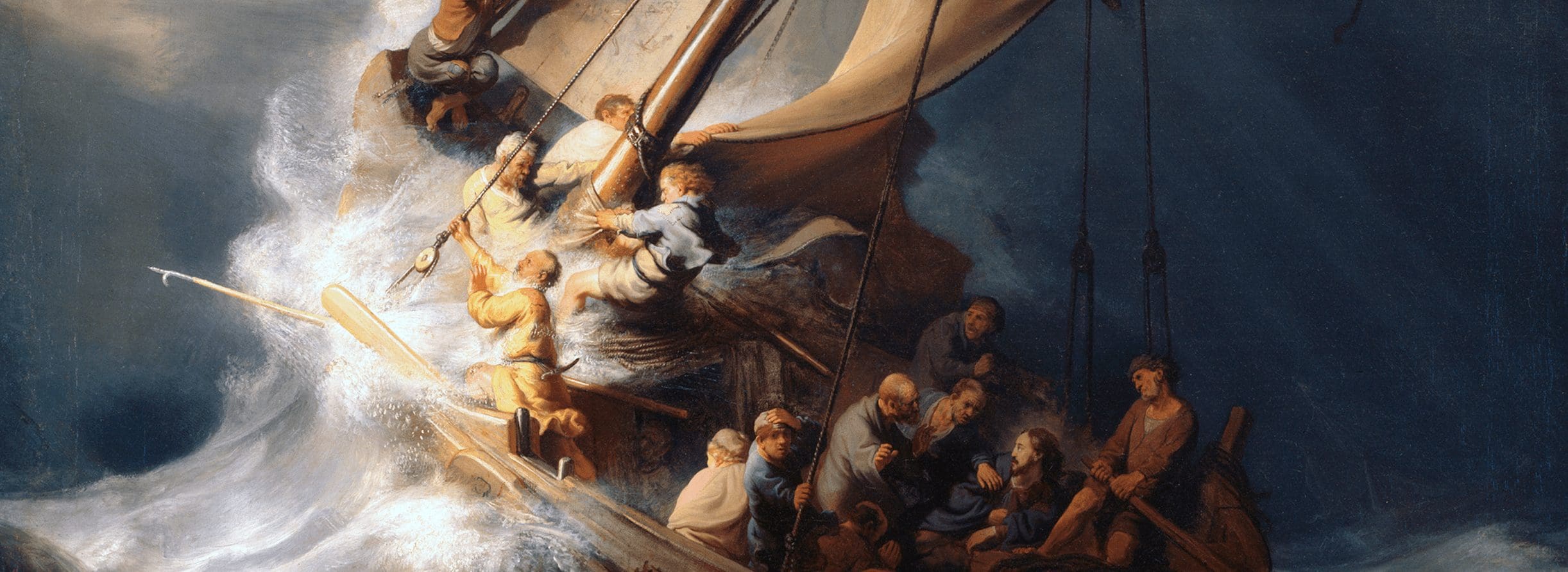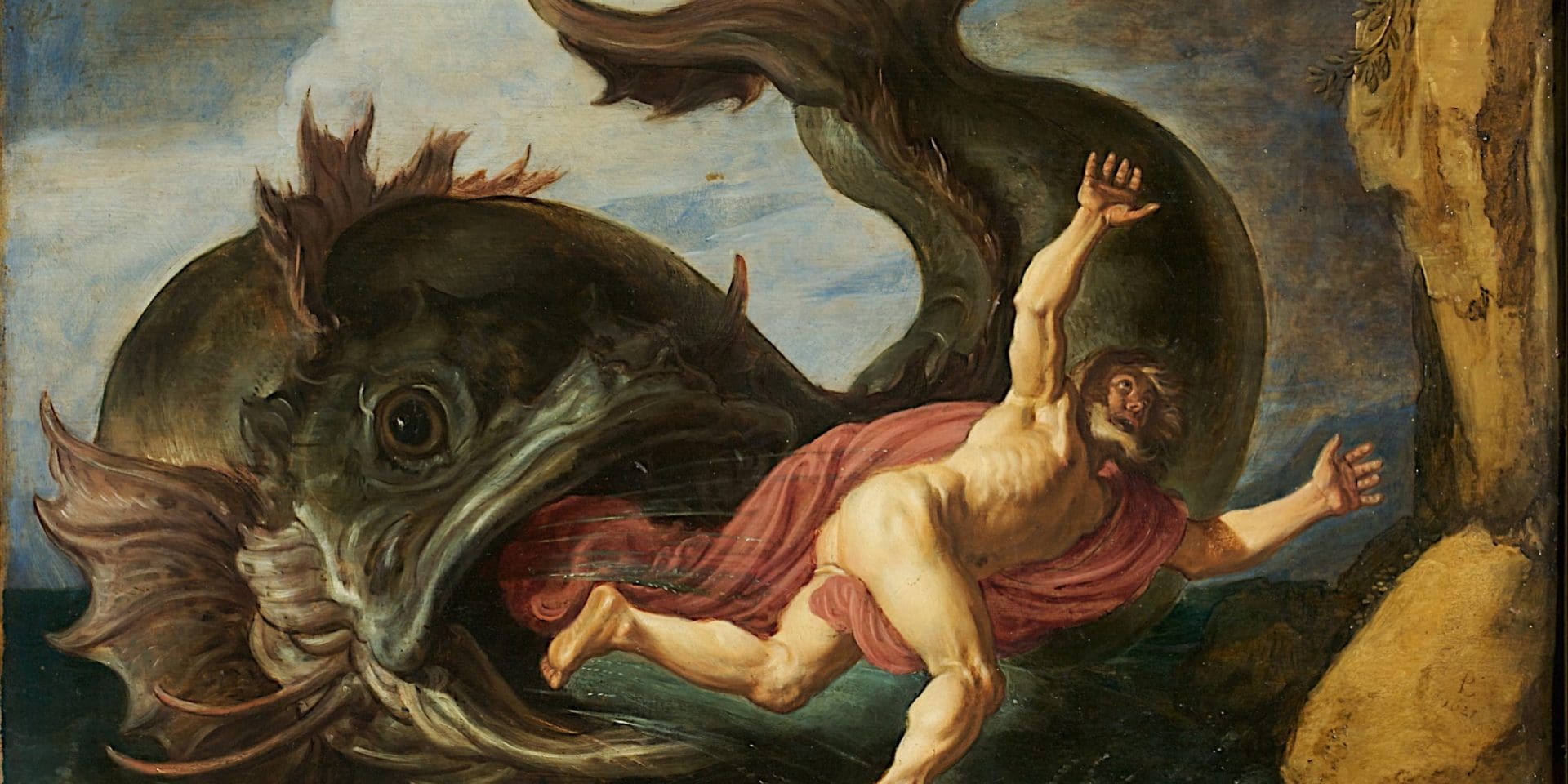Surfing the web and scouting theological prospects is a dangerous game. None quite so dangerous as the one I stumbled upon just yesterday. The Bible Project is a famous Christian media group with over 3 million subscribers that produce very well-crafted animations about the Bible. From what I can tell, most of their scholarly research, superintended by Tim Mackie, is well done. That is, until I watched their overview of Jonah, boasting 2.4 million views. My jaw dropped. I was hooked, and not in a good way. Like a fish, I was being reeled through the murky, ankle-deep waters of liberal theology. If you didn’t catch it before, or perhaps you have never seen the video, I’ll summarize the issue for you, here. Mackie makes quite a few substantial claims:
• Jonah the book is pure satire or comedy, not historical (or prophetic).
• Jonah the person prophesies out of his own volition and desire, not God’s will and word.
• Jonah the person is a really mean, nasty, rebellious, conniving, and selfish character.
• Jonah the person hates God for loving his enemies, does not worship him, and would rather die than live with Him.
So–––when you stack all these claims together, what do you get? Mackie is teaching that Jonah is a false prophet. Except Mackie doesn’t use the exact words ‘false prophet’, instead he paints Jonah red, as if he just so happens to have all the characteristics of a false prophet. But do you recall the verse that calls Jonah false? Or as crooked as a barrel of fishhooks? I sure don’t. Scripture is usually pretty explicit when a supposed “man of God” is not in good standing with God. When a false prophet gets as much screen time, so to speak, as Jonah, they are identified as such; they are not left to the whims of viewer discretion to determine whether the prophet is true or false. There is a deep conflict in Mackie’s conclusion and the Scriptural verdict. So, let’s sink our teeth into Jonah and find out why–––the book I mean, not the person.
Jonah the Satirical Fable
Mackie certainly didn’t conjure this fish story all up on his own. This distasteful rendering (rhetoric) of Jonah’s character stems out of the early nineteenth century wave of liberal scholarship and literary criticism, portraying Jonah as a satiric fable and didactic comedy that, like the book of Esther, is all too ‘convenient’ to be real and, therefore, directs the reader’s attention to a more pressing moral concern: Forgive your enemies. Mackie states that satire such as Jonah is about “well-known figures who are placed in extreme circumstances and they use humor and irony to critique their stupidity and character flaws”, and he unduly supports his own position by over-literalizing the king’s decree to fast, purporting that “even the king’s cows repent”, which implies that the book is ahistorical and fictional[1]. So, while the moral of the story is retained in some respect, it does so at the expense of its historical prophecy. Considering Jonah is referenced as a real person in the historical canon of 2 Kings 14:25, which Mackie draws attention to early in the video, means that this story was written as a polemic against Jonah’s character–––pure fictional satire. It is a fictional story about a real false prophet. This new ahistorical one-man’s-fish-is-another-man’s-poison interpretation dates to 1802 with Thomas Paine, an irritable deist who harboured contempt for prophecy, miracles, and the Church at large, proclaiming “My own mind is my own church”[2] and arguing that Jonah “has been written as a fable, to expose the nonsense and satirize the vicious and malignant character of a Bible-prophet.”[3] Paine’s view sustains that all prophets are “useless and unnecessary” characters, and Jonah is the tip of his spear.
At first glance, relegating the book of Jonah to a parable or pure fiction does not seem like such a big ordeal; the prophetic and moral themes are still retained in a parabolic setting or literary framework. I see no issue with God using a parable as a prophecy (prophecy can be symbolic after all, cf. Genesis 3:15; Romans 16:20). The problem is that this new interpretation strives against the history and prophecy in the Bible, historical theology of the Church, and Christ’s historical view of Jonah, so much so that if this view is believed gospel true, it puts into question whether Christ held false beliefs (cf. Matthew 12:39-41; Luke 11:28-32), which, as we ought to know by now, has catastrophic reverberations for the believer as well as Scripture. To reject a belief Christ held is to challenge His deific status because God cannot hold false beliefs. Ironically, this so-called trivial view is quite the big fish; a lot is on the line, here.
That said, Mackie is right to highlight that Jonah is overflowing with divine irony, enriched by the prophet’s hypocrisy and atypical responses by the pagan sailors and Assyrians. It’s worth noting that even if a book’s genre were satire or comedy, it does not necessarily render the book ahistorical; a story can be selectively written and historically curated to illustrate/emphasize such divinely ironic and comedic hallmarks, as the prophet Samuel accomplished with Judges and 1 Samuel; furthermore, to condense such into a novella like Jonah would only intensify, if not, embellish its divine irony. Be that as it may, ancient Judaism and Christian history paint a very different story; everyone unanimously valued Jonah as prophet, and his book to be prophecy and history. It never even crossed their minds that the book was fictional satire about a false prophet.
“The men of Nineveh will rise up at the judgment with this generation and condemn it, for they repented at the preaching of Jonah, and behold, something greater than Jonah is here.”
Matthew 12:41
Jonah’s Reception in History. During the intertestamental period, the priest Eleazar highlighted Jonah “wasting away in the belly of a huge, sea-born monster” alongside Shadrach, Meshach, Abednego, and Daniel in his prayer for deliverance, protection, and restoration against Israel’s abominable and lawless enemies (3 Maccabees 6:6-9). In rabbinic tradition (Mishnah, b. Taan. 16a), the story of Nineveh’s repentance and deliverance from divine judgment is a call for Israel to repent. Jonah is read in the synagogue during Yom Kippur, the Day of Atonement, which is observed through fasting, meditation, self-reflection, forgiveness, and repentance[4]. Jonah is not read in public for kicks and giggles. In Church history, this divine forgiveness is typified by Christ and his love for the world, where early Church Fathers like Tertullian revered the book as exemplar of God’s grace and love for the Gentiles, Augustine against the same anti-miracle rhetoric taught Jonah prophesied the advent and resurrection of Christ[5], Cyril of Jerusalem saw God’s willingness to deliver from death[6], and John Calvin concludes Jonah was a “type of Christ”[7], which Christ Himself draws attention to and then some: “An evil and adulterous generation seeks after a sign, and no sign will be given to it except the sign of the prophet Jonah. For as Jonah was three days and three nights in the belly of the great fish, so will the Son of Man be three days and three nights in the heart of the earth. The men of Nineveh will rise up in the judgment with this generation and condemn it, because they repented at the preaching of Jonah; and indeed a greater than Jonah is here.” (Matthew 12:39-41; see also Luke 11:28-32)
There are several things to consider, here, regarding Christ’s position against this new interpretation. First, it seems almost self-evident that Christ is binding Nineveh’s repentance to history because he juxtaposes the immediate generation and their immoral stature and condemnation to the repentant Ninevites. It is not, ‘as if’ Nineveh repented, it is “because” Nineveh repented. Fictional characters do not “rise up in the judgment” against actual people to condemn them. Second, when Jesus says that “a greater than Jonah is here,” do you think He’s telling a joke? Well, according to Bible Project, He most certainly is – and it’s just hilarious! – because everyone and their cow is greater than the false prophet Jonah. Third, Christ calls Jonah’s prophetic utterances of thanksgiving and return to life from the watery depths of Sheol a sign that parallels His sign of resurrection, “For as Jonah was three days and three nights in the belly of the great fish, so will the Son of Man be three days and three nights in the heart of the earth”. Consider; if Christ has a false belief about the historical Jonah, can we really trust his prophetic resurrection claims? Christ, who claims to be God, cannot hold false beliefs.
In all irony, Paine once said that “I have too much respect for the moral character of Christ to believe that he told this whale of a miracle himself…. It requires, however, a great deal of faith in the devil to believe this miracle.”[8] For a person who supposedly cherishes Christ’s integrity so much, you would think he would spare a moment to read what He said! This new interpretation of Jonah as a satirical fable about a false prophet is of the same skin; it is a recent, cynical development founded in anti-miracle rhetoric that has devastating consequences for maintaining sound doctrine. As I’ve expressed in the past, the genre of Jonah is neither fish, flesh, nor good red herring, it is a typological narrative grounded in history.
Jonah the False Prophet
With Christ’s belief about Jonah in view, is it really fair to accuse Jonah of spouting off “a whole bunch of religious mumbo-jumbo”? The entire video, Mackie intentionally makes the viewer “suspicious of Jonah’s character” and likens him to a false prophet without outright saying, ‘Jonah is a false prophet’. So, what qualifies a person to be a false prophet in the first place? Well, according to the Pentateuch, and later prophetic texts, a false prophet is someone who claims to speak on God’s behalf but is, in fact, speaking out of his own desire or volition or imagination, and was to be put to death for doing so–––not raised from the dead, as in the case of Jonah (Deuteronomy 18:20-22; 13:1-5; Jeremiah 14:14; 23:16; Ezekiel 22:28). How does Mackie go about this incredulous notion, that Jonah is a false prophet?
According to Mackie, Jonah prophesies out of his own volition or desire. The video opens with Jonah’s historical prophecy given to King Jeroboam II “promising that he would win a battle and regain all his territory on Israel’s’ northern border”, which they acknowledge comes to pass (2 Kings 14:23-25) –– a sign of a true prophet –– but, then he immediately reverts this by saying that “Amos also confronted Jeroboam and through him God specifically reversed Jonah’s prophecy, promised Jeroboam he would lose all those same territories because he was so horrible” (Amos 6:13-14). Mackie pits God’s words against Jonah’s! Considering that he was clearly predetermined to hold this view prior to investigation, he completely misses the condition set on Jonah’s prophecy. God’s words spoken through the prophet was conditional upon Jeroboam repenting of pagan practices, removing idol worship, giving thanks to God for their territorial prosperity, et cetera–––none of which he did. Amos, then, directly warns him/them to repent–––or else. So goes the story of every king in Israel (i.e., Saul, Solomon, Ahab, et cetera). Amos, like every other prophet before and after him, prophesies against Jeroboam and northern Israel because he/they did not repent. God did not “reverse” Jonah’s prophecy, nor His own for that matter, it was conditional upon repentance.

Rembrandt van Rijn, “Christ in the Storm on the Lake of Galilee” (c.1633). Oil on canvas.
Regarding Jonah’s prophecy in Jonah 3, Mackie critiques his “sermon”, which he has already predetermined is not a prophecy, for its brevity and peculiarity. He says, “There’s no mention of what the Ninevites have done wrong or of what they should do to respond. There’s no mention of who might overturn them. And most noticeable, there’s no mention of God. What’s going on here? Has Jonah intentionally given the bare minimum of information? It’s like he’s trying to sabotage his own message or ensure the Ninevites destruction. There’s just no effort on Jonah’s part here. Whatever his motives are, the plan doesn’t work.” Given that we have already established that there is no reason to be suspicious of Jonah’s character based on the historical canon, and we’ve established that Jonah is not a false prophet, it seems rather odd to question Jonah’s motivations, here, and even more disconcerting to claim he’s sabotaging “his own message” if he is simply speaking on God’s behalf? Mackie, then, jests that Jonah’s prophecy is “comical” and that his “words actually came true, but not in the way that he intended.” Please be advised that there is no indication anywhere in the text that Jonah intended “his” prophecy not to work. In fact, we know that he did not hold back because he is pouting, if not, gnashing and brooding in Jonah 4 – he knows that God will forgive Nineveh!
“O Lord, is not this what I said when I was yet in my country? That is why I made haste to flee to Tarshish; for I knew that you are a gracious God and merciful, slow to anger and abounding in steadfast love, and relenting from disaster. Therefore now, O Lord, please take my life from me, for it is better for me to die than to live.” (Jonah 4:2-3)
A false prophet does not understand God’s character, yet Jonah truly understood God’s heart (compare Jonah 4:2 to Exodus 34:6-7); he knew God would show ‘grace and mercy in lovingkindness’ on Nineveh if they repented.
Last thing to consider, here, is that when Jonah is praying to God, he is actually conversing with Him. False prophets don’t speak with God on a personal level in this way. God is even giving him constructive criticism! (Jonah 4:5-11) Furthermore, Mackie acknowledges that Jonah prays – why is a false prophet praying to the one true God in the first place? It’s incoherent. False prophets speak out of their own thoughts pretending to be listening to God, so there is no reason to pray, here. Both of Jonah’s prophecies came true because he is truly speaking on God’s behalf, not out of his own imagination, desire, or volition. Like Christ who was also accused of being a false prophet, Jonah being raised from the dead vindicates his position as a true prophet of God[9].
Jonah the God-Hating, Spiteful Bigot
Last, but certainly not least, the video opens with Mackie making a bunch of bold unbiblical claims about Jonah’s character and his disdain toward God, claiming he is a cold fish who “hates God for loving his enemies”, and that he is “really mean and nasty”. Mackie also claims that “unlike Jonah” the pagans “actually worship God” that Jonah would “rather die than live with the God who forgives His enemies”. This unbiblical, unscrupulous harpooning of Jonah’s character is carried on throughout the video. Yet, nowhere in Scripture does it say Jonah personally hates God, for any reason let alone for loving his enemies, nor does it say that Jonah does not worship God. There is no evidence in the text to support any of these notions. It is obvious that Jonah hates what God is doing–––sure. But hating the person and hating the act are two very different things, especially given the circumstances. In fact, quite the opposite is true. In Jonah’s prayer of distress, he explicitly gives thanksgiving to God and says that he worships Him: “I called out to the Lord, out of my distress, and he answered me; out of the belly of Sheol I cried, and you heard my voice…. I with the voice of thanksgiving will sacrifice to you; what I have vowed I will pay. Salvation belongs to the Lord!” (Jonah 2:9) And is not our proper worship more than the sacrifice of burnt offerings, but in the sacrifice of our heart in contrition and thanksgiving? As the prophet Hosea reveals, “For I desire steadfast love and not sacrifice, the knowledge of God rather than burnt offerings.” (Hosea 6:6) As the psalmist David sings, “The sacrifices of God are a broken spirit; a broken and contrite heart, O God, you will not despise.” (Psalm 51:17) As the apostle Paul declares, “I appeal to you therefore, brothers, by the mercies of God, to present your bodies as a living sacrifice, holy and acceptable to God, which is your spiritual worship.” (Romans 12:1)
Perhaps, at this point you might be wondering: Why does Jonah hate Nineveh so much? Well, by all human standards, he has a good reason for this opinion. It is not godly, but it is understandable. Mackie paints Jonah to be a terrible, xenophobic, spiteful bigot, but the historical and cultural context surrounding Jonah’s life would probably make you cringe otherwise. Assyria was not just Israel’s “bitter enemy”, like big bullies on the playground, culturally speaking they were monsters by all moral standards. Let me explain.
Assyria burnt people alive, skinned people alive (“flaying”), built towers or cladded city walls out of stretched skins, dismembered or plucked genitalia off men like “seeds of cucumbers”[10]–––need I go on? At the time, these same Assyrians posed a massive, immediate, and aggressive threat to Israel. Some scholars even place Jonah’s account after the Assyrian Exile, which would probably only fuel his bitterness and anger even more[11]. Jonah, by human standards, had a right to be ‘damned angry’ (Jonah 4:9) with the amoral conduct oozing out of Nineveh, the capital city of Assyria. Perhaps, his friends or family, or the generation Jonah was written for, were victims of such atrocities. Jonah attempted to flee to Tarshish in the south of Spain because, he thought (and hoped), by going to the opposite end of the Mesopotamian world, or by being cast into the raging sea, God would simply destroy Assyria. He would rather die than betray his people. But how does Mackie spin it? That Jonah would “rather die than live with the God who forgives His enemies”. This is quite the overstep. Jonah might hate what God is doing all things considered, but it doesn’t mean he hates God. Put yourself in Jonah’s boat for a moment: Could you forgive someone who peeled the skin from your family, friends, or children and used them as wallpaper? This isn’t Portland.
Hook, Line, and Sinker.
This video is a smelly red herring. Either Mackie is guilty of inadvertently accusing Jonah to be a false prophet or he is guilty of not understanding his own teaching, respectively. By trivializing Jonah’s character to be a stuck-up prick who hates God and doesn’t like forgiving his enemies, and minimizing the cruelty of Assyrian culture, it reduces the breadth of God’s grace and mercy explicit in the text, prophetic subtext, and historical context. By painting Jonah as a false prophet, it undermines Christ’s belief about Jonah regarding himself. It is terribly irresponsible. Likewise, by making Jonah satire, it has devastating theological consequences for maintaining sound doctrine and logically challenges Christ’s deity for holding false beliefs. While the emphasis on divine forgiveness, deliverance, grace, and desire for all to be saved (2 Peter 3:9; 1 Timothy 2:3-4) are still partially intact in a parabolic view, the new interpretation deflates the intensity of these themes as well as the historical reality of God’s love for humanity. All in all, the fish stinks from the head down.
But he got the plot right.

Matlock Bobechko is the Chief Operating/Creative Officer of Bible Discovery. He is an eclectic Christian thinker and writer, award-winning screenwriter and short filmmaker. He writes a blog on theology, apologetics, and philosophy called Meet Me at the Oak. He is also an Elder at his local church.
[1] Mackie’s over-literalization of the king’s decree, here, is altogether unwarranted. The text never mentions that the cows repented in and of themselves, rather the king declares a temporal law of fasting: “Let neither man nor beast, herd nor flock, taste anything. Let them not feed or drink water, but let man and beast be covered with sackcloth, and let them call out mightily to God. Let everyone [person] turn from his evil way and from the violence that is in his hands. Who knows? God may turn and relent and turn from his fierce anger, so that we may not perish.” (Jonah 3:7-9) Clearly, the intention of the text is not to claim that cows and pigeons are repenting at the king’s orders, even if creation groans for the revealing of the sons of God (Romans 8:19). Rather, the citizens of Nineveh are called to humbly observe the king’s order by prohibiting food and drink for all living creatures and covering sackcloth on all life as a sign of their sincere repentance. The king’s response could very well be based on the religious context of Jonah’s coming out of a giant fish, that the God of Israel overpowered their god and rules all creatures of the earth including their livestock, which is the source of their prosperity and livelihood (i.e., food, milk, clothes, farming, trade, economy, et cetera).
[2] Thomas Paine, Age of Reason (1807; Feedbooks), 5.
http://klymkowskylab.colorado.edu/Readings/Thomas%20Paine%20-%20The%20Age%20of%20Reason.pdf.
[3] Thomas Paine, Age of Reason (1807; Feedbooks), 116.
http://klymkowskylab.colorado.edu/Readings/Thomas%20Paine%20-%20The%20Age%20of%20Reason.pdf.
Stephen L. Cook, John T. Strong, Steven S. Tuell, The Prophets: Introducing Israel’s Prophetic Writings (Minneapolis, MN: Fortress Press, 2022), 362.
[4] Stephen L. Cook, John T. Strong, Steven S. Tuell, The Prophets: Introducing Israel’s Prophetic Writings (Minneapolis, MN: Fortress Press, 2022), 363-5.
[5] Augustine, Letter 102, section 30-38 (AD 409). Extracted from The Church Fathers––Nicene and Post-Nicene Fathers, First Series, Volume 1, Augustin: Prolegomena, Confessions, Letters (Peabody, MA: Christian Literature Publishing Company, January 2012)
[6] Catechetical Lectures, on Matthew 12:40
[7] John Calvin, Commentary on Jonah, Lecture 72, in Commentaries on the Twelve Minor Prophets, translation, John Owen (Edinburgh: Calvin Translation Society, 1847; Grand Rapids, MI: Christian Classics Ethereal Library, 2005)
https://ccel.org/ccel/calvin/calcom28/calcom28.iii.1.ii.html
[8] Thomas Paine, Age of Reason (1807; Feedbooks), 60.
http://klymkowskylab.colorado.edu/Readings/Thomas%20Paine%20-%20The%20Age%20of%20Reason.pdf.
[9] Mackie also seems to disconnect the Messianic prophecy from Jonah’s prayer and pseudo-resurrection while in the belly of the sea-beast (Jonah 2): “Now, of course under normal circumstances this would be certain death, but in this story, everything’s upside down. And so Jonah’s submarine death becomes his passage back to life.” Does this refer to Christ or not? Christ seems to think so. So, perhaps, it’s not upside down after all. The prophetic aspect of this prayer is lost in this new interpretation, which Mackie claims is a “prayer of repentance, kind of”. This prayer is not about His life, it is not a diegetic concern, it was a non-diegetic typological prophecy about Christ who was to rise from the dead.
[10] Erika Belibtreu, Grisly Assyrian Record of Torture and Death (Editor, H. S. (2002;2002). BAR 17:01 (Jan/Feb 1991). Biblical Archaeology Society.
https://faculty.uml.edu/ethan_spanier/teaching/documents/cp6.0assyriantorture.pdf
[11] Havazelet, Meir. “Jonah and the Prophetic Experience.” Tradition: A Journal of Orthodox Jewish Thought 10, no. 4 (1969): 29.






